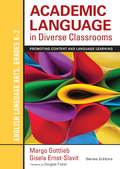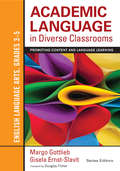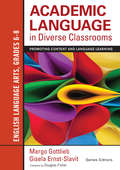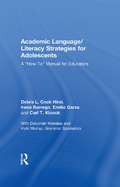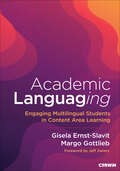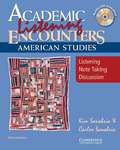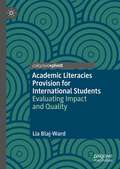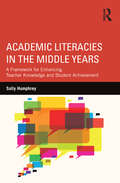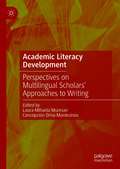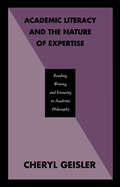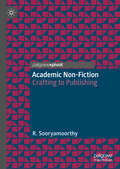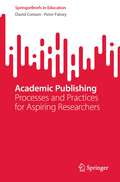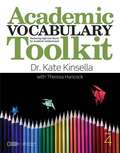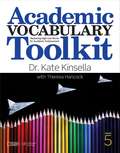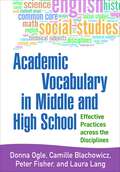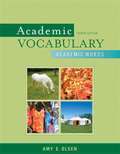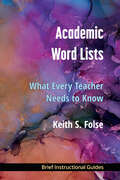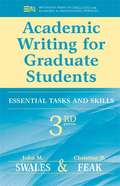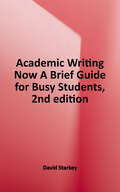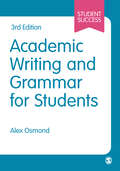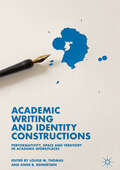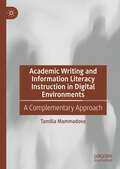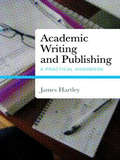- Table View
- List View
Academic Language in Diverse Classrooms: Promoting Content and Language Learning
by Dr Margo Gottlieb Gisela Ernst-SlavitMake every student fluent in the language of learning. The Common Core and ELD standards provide pathways to academic success through academic language. Using an integrated Curricular Framework, districts, schools and professional learning communities can: Design and implement thematic units for learning Draw from content and language standards to set targets for all students Examine standards-centered materials for academic language Collaborate in planning instruction and assessment within and across lessons Consider linguistic and cultural resources of the students Create differentiated content and language objectives Delve deeply into instructional strategies involving academic language Reflect on teaching and learning
Academic Language in Diverse Classrooms: Promoting Content and Language Learning
by Dr Margo Gottlieb Gisela Ernst-SlavitMake every student fluent in the language of learning. The Common Core and ELD standards provide pathways to academic success through academic language. Using an integrated Curricular Framework, districts, schools and professional learning communities can: Design and implement thematic units for learning Draw from content and language standards to set targets for all students Examine standards-centered materials for academic language Collaborate in planning instruction and assessment within and across lessons Consider linguistic and cultural resources of the students Create differentiated content and language objectives Delve deeply into instructional strategies involving academic language Reflect on teaching and learning
Academic Language in Diverse Classrooms: Promoting Content and Language Learning
by Dr Margo Gottlieb Gisela Ernst-SlavitMake every student fluent in the language of learning. The Common Core and ELD standards provide pathways to academic success through academic language. Using an integrated Curricular Framework, districts, schools and professional learning communities can: Design and implement thematic units for learning Draw from content and language standards to set targets for all students Examine standards-centered materials for academic language Collaborate in planning instruction and assessment within and across lessons Consider linguistic and cultural resources of the students Create differentiated content and language objectives Delve deeply into instructional strategies involving academic language Reflect on teaching and learning
Academic Language/Literacy Strategies for Adolescents: A "How-To" Manual for Educators
by Debra L. Hirai Irene Borrego Emilio Garza Carl T. KloockFast-paced, practical, and innovative, this text for pre-service and in-service teachers features clear, easily accessible lessons and professional development activities to improve the delivery of academic language/literacy education across the content areas in junior/middle school and high school classrooms. Numerous hands-on tools and techniques demonstrate the effectiveness of content-area instruction for students in a wide variety of school settings, particularly English language learners, struggling readers, and other special populations of students. Based on a strong professional development model the authors have been instrumental in designing, Academic Language/Literacy Strategies for Adolescents addresses: motivation attributes of academic language vocabulary: theory and practice reading skills development grammar and writing. A wealth of charts, graphs, and lesson plans give clear examples of academic language/literacy strategies in action. The appendices – a key component of the practical applications developed in the text – include a glossary, exemplary lessons that address key content areas, and a Grammar Handbook. In this era of increased accountability, coupled with rapid demographic change and challenges to traditional curricula and pedagogical methods, educators will find this book to be a great resource.
Academic Languaging: Engaging Multilingual Students in Content Area Learning
by Gisela Ernst-Slavit Margo GottliebRethink how academic languaging can transform content area teaching For years, the teaching of content-based academic language to multilingual learners has focused on formulas, vocabulary lists, and sentence patterns—often sidelining students’ linguistic and cultural strengths. Gisela Ernst-Slavit and Margo Gottlieb address these challenges by embracing academic languaging, an active, collaborative student-driven process. Academic Languaging offers strategies to integrate language and content learning while fostering student engagement, voice, and agency. Dedicated chapters on academic languaging for Language Arts, Mathematics, Social Studies, and Science highlight the dimensions of disciplinary language for each subject and provide strategies for moving learning forward with multilingual learners. Additional features include: "Stop and Think" prompts to help educators connect new ideas with their instructional settings Prompts at the end of each chapter to encourage deeper thinking and application of the material Multilingual examples to mirror the varied classroom settings in the U.S. and beyond. The ultimate resource for educators committed to empowering multilingual learners and fostering meaningful, culturally sustaining education, Academic Languaging ensures multilingual learners comprehend academic content and thrive as confident, autonomous drivers of their own learning.
Academic Languaging: Engaging Multilingual Students in Content Area Learning
by Gisela Ernst-Slavit Margo GottliebRethink how academic languaging can transform content area teaching For years, the teaching of content-based academic language to multilingual learners has focused on formulas, vocabulary lists, and sentence patterns—often sidelining students’ linguistic and cultural strengths. Gisela Ernst-Slavit and Margo Gottlieb address these challenges by embracing academic languaging, an active, collaborative student-driven process. Academic Languaging offers strategies to integrate language and content learning while fostering student engagement, voice, and agency. Dedicated chapters on academic languaging for Language Arts, Mathematics, Social Studies, and Science highlight the dimensions of disciplinary language for each subject and provide strategies for moving learning forward with multilingual learners. Additional features include: "Stop and Think" prompts to help educators connect new ideas with their instructional settings Prompts at the end of each chapter to encourage deeper thinking and application of the material Multilingual examples to mirror the varied classroom settings in the U.S. and beyond. The ultimate resource for educators committed to empowering multilingual learners and fostering meaningful, culturally sustaining education, Academic Languaging ensures multilingual learners comprehend academic content and thrive as confident, autonomous drivers of their own learning.
Academic Listening Encounters: Listening, Note Taking, Discussion (Intermediate)
by Kim Sanabria Carlos SanabriaThis book engages students through interviews and academic lectures on stimulating topics from the field of American Studies. Topics include civil rights, traditional American values in relation to life today, country music, sports, and the globalization of American slang.
Academic Literacies Provision for International Students: Evaluating Impact and Quality
by Lia Blaj-WardThis book reinterprets the relevance, quality and impact of academic literacies provision at university in light of recent higher education developments in a pandemic-transformed world. Drawing on the author's own experience of researching, implementing and assessing academic literacies provision, and on insights from broader scholarship and professional debates, the book helps set a new direction of travel for academic literacies professionals working in a variety of roles to enable and resource students’ academic and professional growth. It makes recommendations for policy, strategy and scholarship-informed practice that place value on communicating with confidence, clarity and care at university and beyond.
Academic Literacies in the Middle Years: A Framework for Enhancing Teacher Knowledge and Student Achievement
by Sally HumphreyThe professional learning framework this book presents is designed to support teachers’ understandings of how language functions in their academic disciplines. This framework—a 4 x 4 metalinguistic toolkit—is informed by systemic functional linguistic theory and international educational research on academic and disciplinary literacies. The book shows and explains how teachers have applied specific 4 x 4 toolkits with students in middle school classrooms across a range of subjects for curriculum literacy instruction, assessment and feedback, resulting in substantial growth for their students in high-stakes national tests of literacy, as well as writing assessments in a number of subjects. In its focus on disciplinary literacies in diverse sociocultural settings, Academic Literacies in the Middle Years responds to contemporary international curricula for English language and literacy and the need for a strong evidence base for professional learning design.
Academic Literacy Development: Perspectives on Multilingual Scholars' Approaches to Writing
by Laura-Mihaela Muresan Concepción Orna-MontesinosThis edited book brings together an international cast of contributors to examine how academic literacy is learned and mastered in different tertiary education settings around the world. Bringing to the fore the value of qualitative enquiry through ethnographic methods, the authors illustrate in-depth descriptions of genre knowledge and academic literacy development in first and second language writing. All of the data presented in the chapters are original, as well as innovative in the field in terms of content and scope, and thought-provoking regarding theoretical, methodological and educational approaches. The contributions are also representative of both novice and advanced academic writing experiences, providing further insights into different stages of academic literacy development throughout the career-span of a researcher. Set against the backdrop of internationalisation trends in Higher Education and the pressure on multilingual academics to publish their research outcomes in English, this volume will be of use to academics and practitioners interested in the fields of Languages for Academic Purposes, Applied Linguistics, Literacy Skills, Genre Analysis and Acquisition and Language Education.
Academic Literacy and the Nature of Expertise: Reading, Writing, and Knowing in Academic Philosophy
by Cheryl GeislerThe first full-length account integrating both the cognitive and sociological aspects of reading and writing in the academy, this unique volume covers educational research on reading and writing, rhetorical research on writing in the disciplines, cognitive research on expertise in ill-defined problems, and sociological and historical research on the professions. The author produced this volume as a result of a research program aimed at understanding the relationship between two concepts -- literacy and expertise -- which traditionally have been treated as quite separate phenomena. A burgeoning literature on reading and writing in the academy has begun to indicate fairly consistent patterns in how students acquire literacy practices. This literature shows, furthermore, that what students do is quite distinct from what experts do. While many have used these results as a starting point for teaching students "how to be expert," the author has chosen instead to ask about the interrelationship between expert and novice practice, seeing them both as two sides of the same project: a cultural-historical "professionalization project" aimed at establishing and preserving the professional privilege. The consequences of this "professionalization project" are examined using the discipline of academic philosophy as the "site" for the author's investigations. Methodologically unique, these investigations combine rhetorical analysis, protocol analysis, and the analysis of classroom discourse. The result is a complex portrait of how the participants in this humanistic discipline use their academic literacy practices to construct and reconstruct a great divide between expert and lay knowledge. This monograph thus extends our current understanding of the rhetoric of the professions and examines its implications for education.
Academic Non-Fiction: Crafting to Publishing
by R. SooryamoorthyThis book offers comprehensive directions to crafting academic nonfiction that is both rigorous and captivating, filling a critical gap in the genre. While academic nonfiction plays a vital role in fostering knowledge-based societies and driving economic growth, there has long been a need for a resource that helps authors create works that are as engaging as they are informative. Designed for both aspiring and established writers, this book provides practical advice and innovative techniques to elevate nonfiction writing. It covers everything from selecting marketable topics and developing effective writing habits to managing time and navigating the complexities of the publication process. Unlike most writing guides, it emphasises how to infuse nonfiction with the allure and engagement necessary to reach a broad audience without compromising accuracy or depth. With short, digestible chapters, insider tips on proposal writing, and insights into the peer review process, this book serves as a step-by-step roadmap to transforming academic writing into compelling works. Essential for writers aiming to produce nonfiction that not only informs but also resonates with readers, this resource is an indispensable tool for creating impactful scholarly work.
Academic Publishing: Processes and Practices for Aspiring Researchers (SpringerBriefs in Education)
by David Coniam Peter FalveyThis book focuses on the topic of academic publishing. It discusses the mounting, serious problems that researchers, particularly new researchers, encounter when trying to publish their research. The book addresses the issues of publishing as well as the salient factors militating against academic publication and the mitigating factors encouraging academic publication. It provides potential solutions, suggestions, and strategies for overcoming some of these problems. Growing research output from Southeast Asia including Singapore, Malaysia, Taiwan, and China reveals the struggles that many authors have to confront when attempting to publish their work in reputable journals. In both South Africa and other parts of Africa, academic researchers are beginning to show strong evidence of credible academic output. These researchers all need valid outlets for their work and the security that authentic peer review brings to the reviewing process. In the fields of education, social sciences, and professional practices, e.g., architecture and law, recent years have seen the emergence of new outlets for practitioners’ research outputs in areas such as one’s own practice, self-reflection, and narrative inquiry. These outlets are discussed in this book. The book also discusses the malign influence of predatory publications in detail. This book will be beneficial to university academics, postgraduate students, Ph.D. supervisors, and new researchers.
Academic Vocabulary Toolkit Grade 4: Student Text
by Theresa Hancock Dr Kate KinsellaDr. Kate Kinsellas NEW Academic Vocabulary Toolkit for Elementary grades is designed to prepare students in grades 3, 4, and 5 for the lexical demands of academic speaking, reading and writing in a Common Core State Standards era. The program ensures students have daily explicit, interactive, and carefully monitored academic language instruction. Students are provided the opportunity to not only learn high-use academic words, but also correctly employ these words in speaking and writing exercises. Using Dr. Kate Kinsellas unique vocabulary teaching process, students will receive the tools needed to master key academic vocabulary, re-engage in school settings, and increase scores on state assessments.
Academic Vocabulary Toolkit: Mastering High-Use Words for Academic Achievement (Grade 5)
by Kate Kinsella Theresa HancockDr. Kate Kinsella's NEW Academic Vocabulary Toolkit for Elementary grades is designed to prepare students in grades 3, 4, and 5 for the lexical demands of academic speaking, reading and writing in a Common Core State Standards era. The program ensures students have daily explicit, interactive, and carefully monitored academic language instruction. Students are provided the opportunity to not only learn high-use academic words, but also correctly employ these words in speaking and writing exercises. Using Dr. Kate Kinsella's unique vocabulary teaching process, students will receive the tools needed to master key academic vocabulary, re-engage in school settings, and increase scores on state assessments.
Academic Vocabulary in Middle and High School: Effective Practices across the Disciplines
by Camille Blachowicz Donna Ogle Peter Fisher Laura LangIn order to succeed in school and beyond, students in grades 6-12 need to understand and use both academic language and discipline-specific vocabulary. This book describes effective practices for integrating vocabulary study with instruction in English language arts, history/social studies, and math and science, and for helping students become independent, motivated word learners. The expert authors present a wealth of specific teaching strategies, illustrated with classroom vignettes and student work samples. Connections to the Common Core State Standards (CCSS) are highlighted throughout; an extensive annotated list of print and electronic resources enhances the book's utility.
Academic Vocabulary, Academic Words (4th edition)
by Amy E. OlsenAcademic Vocabulary presents vocabulary building with a visually stimulating, full-color design to pique students' interest and make the process fun. This attractive, highly-interactive workbook improves academic word knowledge through academic readings and interactive exercises. Repetition of the words and getting the students to see the words used in multiple contexts improves memorization.
Academic Word Lists: What Every Teacher Needs to Know
by Keith S. FolseIn Academic Word Lists, Keith Folse explains how various lists like the Academic Word List (AWL) have become popular tools in the ESL classroom for teaching vocabulary. Following a discussion on the importance of teaching vocabulary, Folse explains why word lists are useful in language learning and how they can help address the lexical gap. He also outlines what words are on the AWL, how the word families are selected, and what teachers should know about other word lists. The book also includes 10 suggestions for using academic word lists in the classroom, including how to use vocabulary notebooks.
Academic Writing For Graduate Students: Essential Tasks And Skills
by John M. Swales Christine FeakLike its predecessor, the third edition of Academic Writing for Graduate Students explains understanding the intended audience, the purpose of the paper, and academic genres; includes the use of task-based methodology, analytic group discussion, and genre consciousness-raising; shows how to write summaries and critiques; features Language Focus sections that address linguistic elements as they affect the wider rhetorical objectives; and helps students position themselves as junior scholars in their academic communities. Among the many changes in the third edition: *newer, longer, and more authentic texts and examples *greater discipline variety in texts (added texts from hard sciences and engineering) *more in-depth treatment of research articles *greater emphasis on vocabulary issues *revised flow-of-ideas section *additional tasks that require students to do their own research *more corpus-informed content *binding that allows the book to lay flat when open. The Commentary (teacher's notes and key) (978-0-472-03506-9) has been revised expanded.
Academic Writing Now: A Brief Guide for Busy Students
by David StarkeyThis Guide is a rhetoric designed to cover the basics of a college writing course in a concise, student-friendly format. Anything inessential to the business of college writing has been excluded. Each chapter concentrates on a crucial element of composing an academic essay and is capable of being read in a single sitting. The book is loaded with "timesaver tips," ideas for making the most of the student's time, along with occasional warnings to avoid common errors made by student writers. Each short chapter concludes with questions and suggestions designed to trigger class discussion. <p><p>The second edition has been updated throughout, with special attention to making the book even better suited to accelerated and co-requisite composition courses.
Academic Writing and Grammar for Students (Student Success)
by Alex OsmondFrom grammar and punctuation, to proofreading and fixing mistakes, this is your one-stop guide to improving your academic writing to achieve better grades at university. Including quotes from tutors and examples of good and bad practice, this book provides step-by-step guidance on Basic conventions of academic writing Critical thinking Conciseness and clarity Proofreading and referencing Common mistakes and how to avoid them. Student Success is a series of essential guides for students of all levels. From how to think critically and write great essays to boosting your employability and managing your wellbeing, the Student Success series helps you study smarter and get the best from your time at university.
Academic Writing and Grammar for Students (Student Success)
by Alex OsmondFrom grammar and punctuation, to proofreading and fixing mistakes, this is your one-stop guide to improving your academic writing to achieve better grades at university. Including quotes from tutors and examples of good and bad practice, this book provides step-by-step guidance on Basic conventions of academic writing Critical thinking Conciseness and clarity Proofreading and referencing Common mistakes and how to avoid them. Student Success is a series of essential guides for students of all levels. From how to think critically and write great essays to boosting your employability and managing your wellbeing, the Student Success series helps you study smarter and get the best from your time at university.
Academic Writing and Identity Constructions: Performativity, Space And Territory In Academic Workplaces
by Louise M. Thomas Anne B. ReinertsenThis book presents multiple cultural and contextual takes on working performances of academic/writer/thinker, both inside and outside the academy. With worldwide, seismic shifts taking place in both the contexts and terrains of universities, and subsequently the altering of what it means to write as an academic and work in academia, the editors and contributors use writing to position and re-position themselves as academics, thinkers and researchers. Using as a point of departure universities and academic/writing work contexts shaped by the increasing dominance of commodification, measurement and performativity, this volume explores responses to these evolving, shifting contexts. In response to the growing global interest in writing as performance, this book breaks new ground by theorizing multiple identity constructions of academic/writer/researcher; considering the possibilities and challenges of engaging in academic writing work in ways that are authentic and sustainable. This reflective and interdisciplinary volume will resonate with students and scholars of academic writing, as well as all those working to reconcile different facets of identity.
Academic Writing and Information Literacy Instruction in Digital Environments: A Complementary Approach
by Tamilla MammadovaThis book offers an interdisciplinary approach to the teaching of academic writing and information literacy in a new digital dimension, drawing on recent trends towards project-based writing, digital writing and multimodal writing in Education, and synthesising theory with practice to provide a handy toolkit for teachers and researchers. The author combines a practical orientation to teaching academic writing and information literacy with a grounding in current theories of writing instruction in the digitalized era, and argue that as digital environments become more universal in modern society - particularly in the aftermath of the coronavirus pandemic - the lines between traditional academic writing and multi-modal digital writing must necessary become blurred. This book will be of use to teachers and instructors of academic writing and information literacy, particularly within the context of English for Academic Purposes (EAP), as well as students and researchers in Applied Linguistics, Pedagogy and Digital Writing.
Academic Writing and Publishing: A Practical Handbook
by James HartleyAcademic Writing and Publishing will show academics (mainly in the social sciences) how to write and publish research articles. Its aim is to supply examples and brief discussions of recent work in all aspects of the area in short, sharp chapters. It should serve as a handbook for postgraduates and lecturers new to publishing. The book is written in a readable and lively personal style. The advice given is direct and based on up-to-date research that goes beyond that given in current textbooks. For example, the chapter on titles lists different kinds of titles and their purposes not discussed in other texts. The chapter on abstracts instructs the reader on writing structured abstracts from the start.
